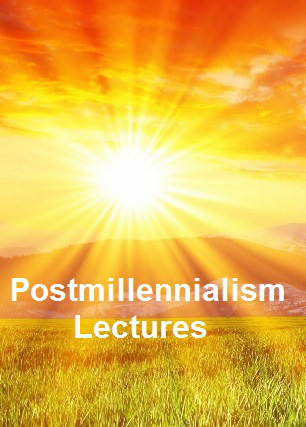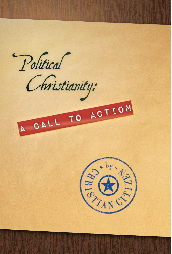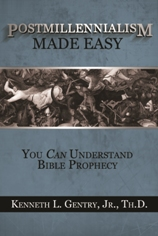DOES THEONOMY REQUIRE POSTMILLENNIALISM?
[image error]PMW 2018–04 by Kenneth L. Gentry, Jr.
Dr. T. David Gordon wrote a critique of theonomy several years ago where he intended to dispel the whole notion of theonomic ethics: T. David Gordon. “Critique of Theonomy: A Taxonomy,” in Westminster Theological Journal, 56 (1994): 23-43 (hereinafter abbreviated: CT). I had many problems with his critique. But one angle is particularly frustrating because it frequently arises. He believe that postmillennialism is one of the foundations of theonomy. Though I am a postmillennialist and a theonomist, as was Bahnsen. The two are not mutually dependent, as amillennial theonomists will attest.
I responded to Gordon in my book Covenantal Theonomy. Gordon’s stated objectives are quite worthy in a debate over the question of theonomic ethics. Regrettably though, he fails to meet his own intentions in several respects. I believe it important to note up-front his failure in securing his own objectives. These may help explain his overall inability to damage theonomy.
Gordon’s taxonomic approach is a helpful idea for distilling key issues in the debate. It certainly far excels Kline’s alleged “review” of Bahnsen’s Theonomy in Christian Ethics which failed miserably in its attempt.
But Gordon does not accurately express himself in his endeavor. He states that he will be presenting arguments “first raised by others” and that he will avoid “exclusively new arguments” (CT, 25). Yet on page 27 he writes: “I have never received an answer to this line of questioning from any of the Theonomists with whom I have conversed.” By his own statement this appears to be his own argument (and not “first raised by others”) and as an unpublished argument it is effectively a “new argument” to the public debate. Of course, this does not directly hinder his public critique, but it does expose his tendency to carelessness, even causing him to fail at his own stated intentions — within the span of two page. This is a recurring problem throughout his critique, as I will show.
Gordon wisely determines to deal with “varying arguments” for Theonomy in an attempt to avoid a strawman approach (CT, 24). And when he actually gets to his critique, he does focus on important issues. Yet in his introduction he immediately evidences confusion regarding theonomy when he states “I will not attempt here a refutation of that particular leg of theonomy known as postmillennialism” (CT, 24).
[image error]
Covenantal Theonomy
(by Ken Gentry)
A defense of theonomic ethics against a leading Reformed critic. Engages many of the leading objections to theonomy.
See more study materials at: www.KennethGentry.com
Simply put: postmillennialism is not a “leg of Theonomy.” Postmillennialism deals with eschatology, not ethics; it deals with what will be, not what ought to be. Theonomists can — and do — hold to various evangelical eschatologies. In introducing this comment, Gordon began to “distinguish” theonomy and Christian Reconstructionism in his second paragraph: “2. Distinguishing Theonomy from Christian Reconstruction.” Oddly though, he really has the matter reversed: Postmillennialism and theonomy are actually legs of Christian Reconstructionism. In 1989 Bahnsen noted in House Divided that theonomy is a leg of Christian Reconstruction: “Such beliefs and practices are at the heart of what is labeled ‘Reconstructionism’ today. Its ethical perspective is termed “theonomic,’ and its eschatological outlook is called ‘postmillennial” (p. 3). In No Other Standard (hereinafter: NOS) Bahnsen wrote: “‘Reconstructionism’ popularly names a theological combination of positions which usually includes presuppositional apologetics, a postmillennial view of eschatology, and a theonomic view of ethics” (NOS, 7 n12).
Even non-theonomists recognize this. Bruce Barron writes: “The Reconstructionists’ intricate, complex program weaves together three levels of ideology. . . . Next come their three key theoretical foundations: biblical law, postmillennial eschatology, and presuppositional philosophy.”1 Ron Nash expresses concern about the “confusion” resulting from “a sloppy use” of terms. He then answers the question “What Is Christian Reconstructionism?” by sorting out subsidiary issues such as theonomy and postmillennialism. 2 The Christian Dictionary of Theology in America defines the Christian Reconstructionist “agenda”: “Three foundational ideas underlie the Reconstructionist agenda: (1) a presuppositional apologetic; (2) a belief that Old Testament law applies today, in ‘exhaustive’ and ‘minutial’ detail; and (3) postmillennialism.”3
[image error]God’s Law Made Easy (by Ken Gentry)
Summary for the case for the continuing relevance of God’s Law. A helpful summary of the argument from Greg L. Bahnsen’s Theonomy in Christian Ethics.
See more study materials at: www.KennethGentry.com
In the text of TCE (p. xxx) itself Bahnsen declared that it is “illogical, and inexcusable propaganda for some theonomic critics to dismiss it as allegedly . . . demanding postmillennial eschatology.” He clearly noted that “the thesis of theonomic ethics is not logically tied to any particular school of millennial eschatology.” 4 He even deems as a faux pas Richard B. Gaffin’s linking postmillennialism and theonomy (NOS, 52). In By This Standard he reiterated this: “What these studies present is a position in Christian (normative) ethics. They do not logically commit those who agree with them to any particular school of eschatological interpretation” (BTS, 8).
Why does Gordon seize this issue up only to fumble it? And especially since he is responding to Bahnsen, and Bahnsen himself specifically, clearly, frequently, publicly, and dogmatically denies any necessary connection between theonomy and postmillennialism? And strangely, Gordon raises this issue immediately after distinguishing Christian Reconstructionism (which does entail postmillennialism) from theonomy. 5 These sorts of missteps plagued his who formal analysis later, as well. Unfortunately, such miscues still plague opponents of theonomy.
Notes
1. Bruce Barron, Heaven on Earth? The Social & Political Agendas of Dominion Theology (Grand Rapids: Zondervan, 1992), 23.
2. Ronald H. Nash, Great Divides: Understanding the Controversies That Come Between Christians (Colorado Springs, Col.: NavPress, 1993), 155. See Ch. 8.
3. Daniel G. Reid, Robert D. Linder, et. al, eds., Concise Dictionary of Christianity in America (Downers Grove, Ill: InterVarsity, 1995), 285.
4. Bahnsen, NOS, 51-52. I suspect that Gaffin’s chapter is the source of Gordon’s mistake, since he mentions some dependence on Gaffin and he tends to pick up on the mistakes of his secondary sources.
5. On p. 24 of CT Gordon urges his reader to consider refutations of postmillennialism in the writings of Gaffin and other Vosian scholars. I have challenged their arguments in several places: Gentry, “Whose Victory in History,” in Gary North, ed., Theonomy: An Informed Response (Tyler, Tex.: Institute for Christian Economics, 1991), 207-230. Gentry, “A Postmillennial Response to Robert B. Strimple,” in Darrell L. Bock, ed., Three Views on the Millennium and Beyond (Grand Rapids: Zondervan, 1999), 130-142. Gentry, “Agony, Irony, and the Postmillennialist” and “Victory Belongs to the Lord” in Gentry, ed., Kenneth L. Gentry, Jr., ed., Thine Is the Kingdom: Studies in the Postmillennial Hope (Vallecito, Calif.: Chalcedon, 2003), 83-176.
Click on the following images for more information on these studies:



Kenneth L. Gentry Jr.'s Blog
- Kenneth L. Gentry Jr.'s profile
- 85 followers



